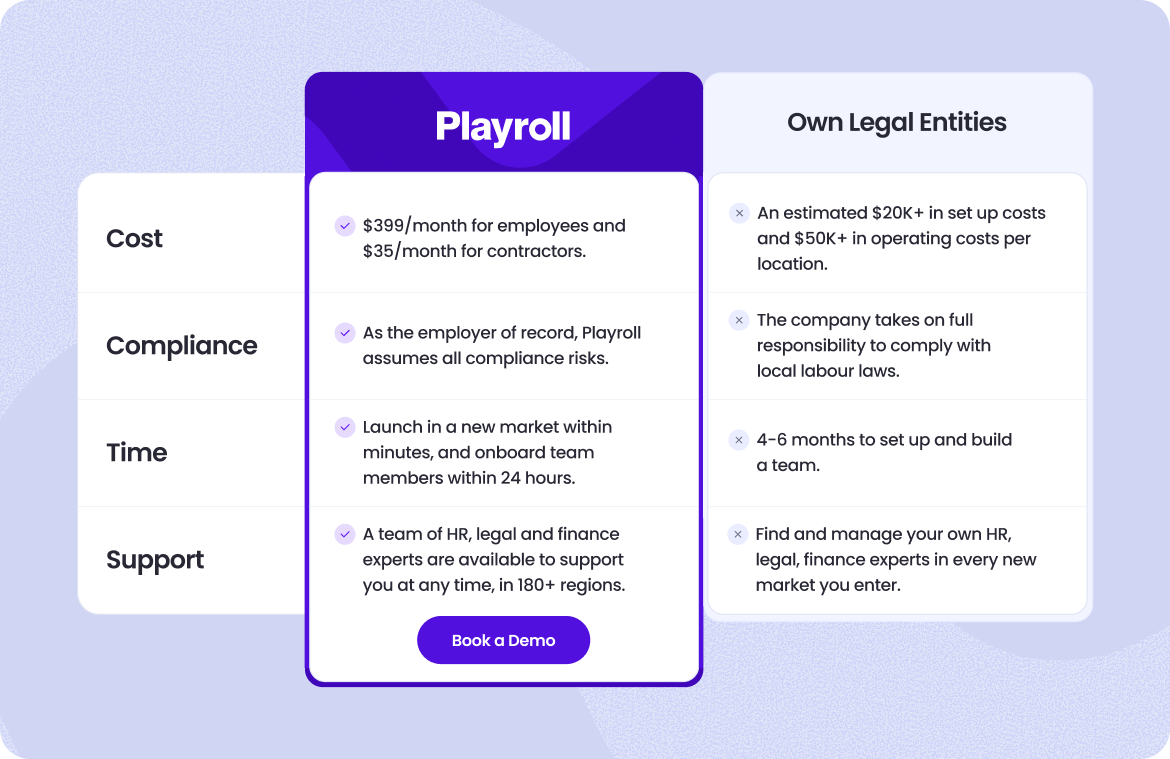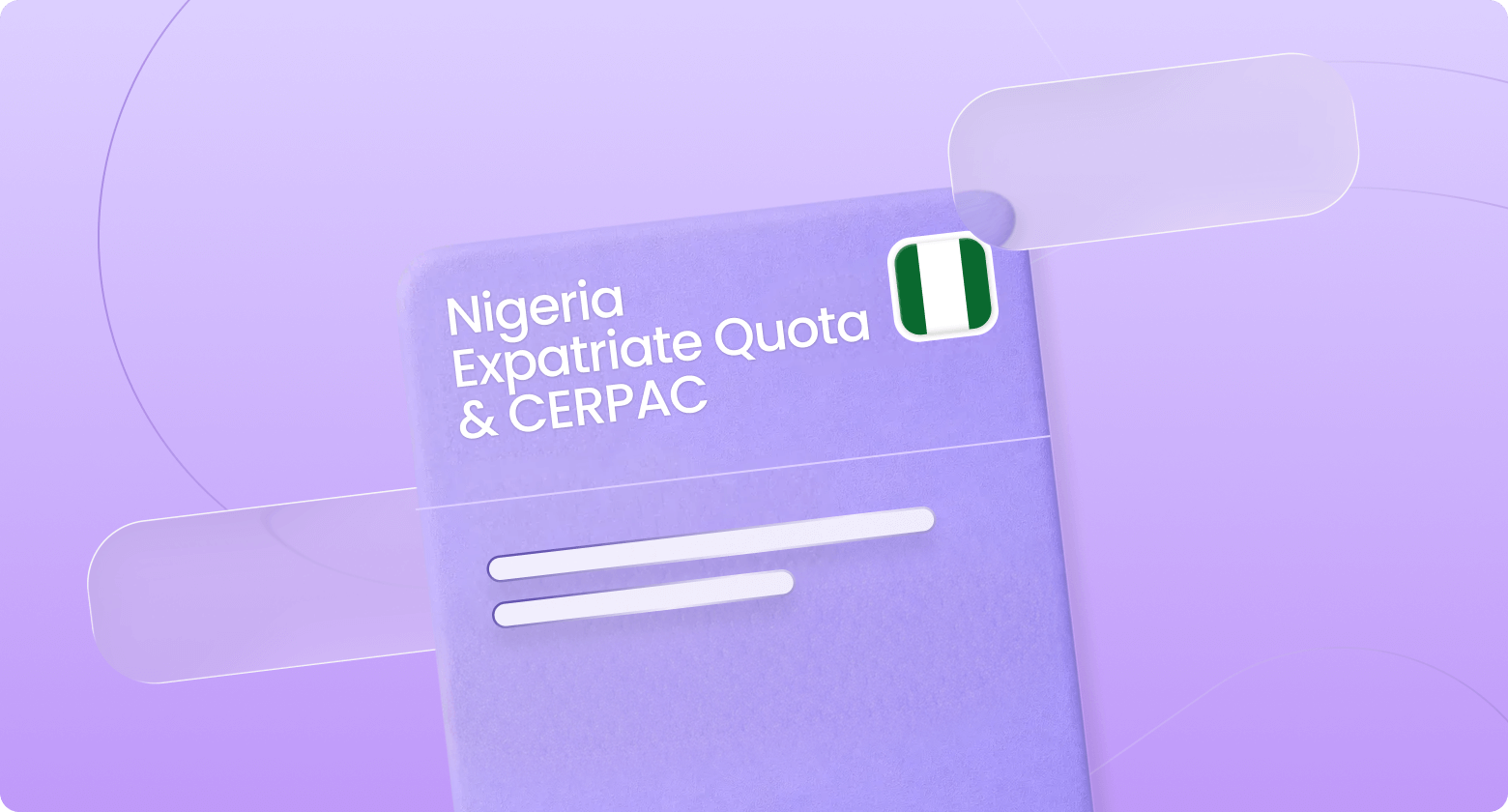Copied to Clipboard
Ready to get Started?


Key Takeaways
Flexible teams are more productive, happier, and stay longer. Remote employees deliver stronger results with fewer distractions and greater autonomy.
By hiring across borders, companies can access diverse, high-quality talent while saving up to $11,000 per remote employee annually through lower overheads.
An Employer of Record like Playroll handle local compliance, payroll, and benefits – enabling companies to scale internationally without legal or administrative hassle.
In 2026, remote work is firmly embedded in how modern organizations operate. Roughly 75% of employed adults whose jobs can be done remotely work from home at least part of the time Working remotely has evolved from a temporary fix into a strategic advantage that smart employers are building directly into their talent acquisition and retention strategies. Employees want flexibility; businesses need agility. Luckily, advances in technology have made it easier than ever for teams to collaborate seamlessly across borders.
For HR leaders, this shift opens up real opportunities. Embracing hiring across borders can reduce costs, boost productivity, strengthen retention, and give you access to more diverse global talent. Companies that act now are shaping , more adaptable teams for the decade ahead.
This guide takes a closer look at what that means in practice. We’ll explore the advantages of working remotely for both employers and employees, from productivity and cost efficiency to satisfaction, inclusion, and long-term resilience.
It also outlines why global hiring has become a core part of modern HR strategy and how an Employer of Record like Playroll makes it simpler to hire, pay, and manage distributed teams compliantly anywhere in the world.
Why Global Companies Are Going Remote
Remote work, often called telecommuting or working from home (WFH), gives employees flexibility to work from anywhere outside the traditional office – whether that’s a home office, coworking space, or another country altogether.
Let’s look at an example of how trends around remote work have shifted. Before 2020, only 12% of the UK workforce had worked remotely at least part of the time. During the pandemic, that figure rose to nearly 50%, and while it has stabilized since then, remote and hybrid arrangements remain significantly higher than pre-pandemic levels.
The continued popularity of global remote teams is driven by the positive outcomes that it continues to deliver. Employers are seeing that when they give people flexibility, teams get more done, better candidates apply, and the business becomes more resilient to change. At the same time, better remote tools and infrastructure, combined with clear remote work policies make it easier for companies to hire and operate across borders.
Global hiring has quickly become a strategic necessity, helping businesses build borderless teams, keep operations running smoothly, and bring in specialised skills from anywhere in the world.
Is Working From Home More Productive?
Research shows that remote work not only maintains but often improves productivity. In 2026, research continues to show that employees working remotely or in hybrid roles gain around 51 additional productive minutes per day compared to office-based colleagues. Similarly, 84% of professionals say they feel more productive when working flexibly.
This increase in efficiency comes from fewer distractions, less commuting stress, and greater autonomy. When performance is measured by outcomes rather than presence, teams tend to focus better and deliver stronger results.
As an employer, the key to running a remote team successfully is structure. The most productive remote teams use clear communication channels, defined deliverables, and the right technology to collaborate effectively. When done well, remote work becomes a measurable performance advantage.
What Are the Benefits of Remote Working for Employees?
Remote work is changing how people live and work for the better. When teams have more flexibility, they tend to show up happier, healthier, and more engaged, which in turn drives stronger performance and loyalty.
Here’s what teams are looking for:
- Work–Life Balance: With no daily commute, people reclaim hours of their day and have more control over how they spend their time. That freedom translates directly into higher energy and focus during working hours.
- Autonomy and Trust: Remote work shifts the focus from time spent to results delivered. When employees are trusted to manage their own work, they take greater ownership and pride in what they do.
- Geographic Freedom: Remote roles give professionals the option to live where they want – whether that means moving closer to family, settling in a more affordable area, or working from a new country altogether.
- Accessibility and Inclusion: Flexibility also opens the door for caregivers, people with disabilities, and anyone outside major cities to participate fully in the global workforce.
Let’s take a look at the benefits of offering remote or hybrid working options to your team in more detail.
1. Increased Productivity and Efficiency
Remote work is a great perk and is proving to be more productive. Studies from Stanford, Harvard Business School, and others have consistently found that remote employees outperform their office-based peers, and that trend is expected to hold strong in 2026.
Organisations continue to report higher output, lower stress, fewer errors from distributed teams. With fewer workplace distractions, more control over their schedules, and the ability to work when they’re at their best, remote employees are delivering stronger results.
The companies seeing the biggest gains are those that focus on outcomes rather than attendance. When success is measured by what people deliver – not how many hours they sit in front of a screen – performance naturally improves.
2. Cost Savings
Remote work remains one of the most effective ways for a startup or scaling business to save money while growing in a sustainable way. Reducing office space, utilities, travel costs, and in-office perks can save organisations an average of $11,000 per remote worker each year.
At the same time, global hiring gives employers a smarter way to save money. By hiring talent where the skills are strongest and the economics make sense, companies are building leaner, more efficient teams. A 2025 report shows U.S. companies have increased offshore headcount by 32% since 2019 vs 16.7% domestically – a clear sign that distributed models are now a core business strategy.
3. Improved Employee Satisfaction and Retention
There’s a clear link between flexible work and job satisfaction, with 79% or employees reporting lower stress when working remotely. And simply put, happier employees stay longer. 76% of professionals say flexibility influences their decision to stay in a role.
When people have the freedom to manage their own schedules and environments, and more time to invest in their home life, they tend to be more motivated and engaged. That translates to better work and lower turnover. Flexible work has become a key part of what makes employees loyal. With the right setup, companies can strengthen culture, engagement, and performance all at once.
4. Access to a Wider Talent Pool
One of the biggest advantages of remote work is the ability to hire from anywhere. Employers are no longer limited to local markets and small talent pools – you can easily bridge skill gaps to find the best person for the job, wherever they’re based.
A 2025 global study found that remote work has gone from simply working outside your central office to becoming truly borderless, with growing demand in markets like India, Canada, Germany, and the UK. This global reach allows companies to fill specialised roles faster and build teams with a wider range of perspectives and skills.
5. Better Disaster Preparedness and Business Continuity
Remote infrastructure allows companies to keep operations running smoothly even when local offices can’t open – whether it’s due to natural disasters, transport strikes, or global crises.
Many businesses now treat remote and hybrid work as a cornerstone of their continuity planning. Cloud collaboration, secure communication tools, and global HR systems make it easy for distributed teams to stay connected and productive under all circumstances.
Playroll’s integrated payroll and compliance systems keep that continuity seamless – ensuring that global teams are supported, paid on time, and fully compliant wherever they’re based.
6. Environmental Impact and Corporate Social Responsibility
Remote work is also a win for the planet. Fewer commutes mean lower emissions, less energy use, and a smaller overall carbon footprint. If every remote-eligible employee worked from home half the time, global greenhouse gas emissions can fall by up to 54%.
Beyond environmental benefits, remote work also supports social responsibility. By enabling flexible, location-independent roles, employers create opportunities for underrepresented groups and demonstrate a real commitment to sustainability – something employees, investors, and customers increasingly value.
7. Increased Diversity and Inclusion Efforts
Remote work has become one of the most effective tools for building diverse and inclusive teams. When hiring isn’t tied to a single office or city, companies can reach a wider range of candidates – across different backgrounds, cultures, and circumstances.
Recent research reinforces the impact: organisations with more diverse management teams generate up to 19% higher innovation revenue than those with less diversity. Another 2025 report from EY highlights that diversity, equity, and inclusion (DE&I) are critical drivers of productivity and economic growth
The Hidden Challenges of Remote Hiring (And How an EOR Solves Them)
While the benefits of hiring remote employees are significant, there’s another side to consider. Expanding across borders brings a level of complexity that many growing companies underestimate. Every country has its unique employment laws, tax systems, and payroll requirements – and managing them without local experts can become overwhelming.
The good news is that these challenges can be managed effectively when you prepare for them proactively. Understanding the potential roadblocks upfront helps companies build stronger, more compliant global teams from the get-go.
Here are some of the most common challenges employers face when hiring internationally – and how an EOR (like Playroll) can help overcome them:
Local Labour Laws and Compliance
- The Challenge: Every country has unique employment laws covering contracts, termination, benefits, and worker classification. Getting these wrong can result in fines or legal risks.
- How an EOR Helps: An EOR acts as the legal employer on your behalf, ensuring every contract and employment relationship complies with local labour laws from day one.
Taxation and Payroll Complexities
- The Challenge: Managing payroll across multiple countries means keeping track of different tax rates, social contributions, and filing requirements. Errors can be costly and erode the trust your team has in your business.
- How an EOR Helps: EORs handle cross-border payroll, tax deductions, and benefits contributions accurately and on schedule, keeping your team compliant and paid on time.
Benefits and Employee Entitlements
- The Challenge: Employee benefits such as healthcare, pension contributions, and paid leave vary widely between countries. Administering them correctly requires local expertise and constant updates as regulations change.
- How an EOR Helps: EORs provide access to compliant, country-specific benefit structures – ensuring fairness for employees and peace of mind for employers.
Entity Setup and Expansion Risk
- The Challenge: Establishing a local entity in every country where you want to hire is costly, complex, and time-consuming. It can take months and involve significant administrative overhead even for a small team.
- How an EOR Helps: An EOR allows companies to hire talent in new countries immediately without setting up a local entity – reducing cost, complexity, and time-to-hire while staying fully compliant.

Cultural and Administrative Differences
- The Challenge: Managing an international workforce means navigating cultural norms, communication styles, and local HR processes that can vary dramatically from one market to another.
- How an EOR Helps: Experienced EORs bring local knowledge and HR support to bridge these gaps, helping companies maintain a consistent employee experience across all regions.
Key Takeaway:
Partnering with an EOR will give your team the freedom to focus on what really matters – hiring great people, building culture, and scaling globally with confidence. The EOR will take care of the legal, payroll, and compliance details in the background.
Managing Global Teams With Playroll
For global employers, this shift in the way people work calls for flexible systems that make it easy to hire, support, and pay people wherever they are. Playroll helps companies do exactly that.
Our global employment platform gives businesses the tools they need to manage distributed teams without getting lost in the legal jargon and the red tape of regulations. From onboarding to global payroll and compliance, everything happens in one place. We built our platform to be as straightforward and stress-free as possible.
Here’s What Sets Playroll Apart:
- Built-In Compliance: Employment laws, taxes, and benefits change from country to country. Playroll’s team of legal and HR experts keeps track of it all so you can stay compliant everywhere you hire.
- People Who Understand Your Market: Behind the platform is a global support team with local knowledge. Whether you’re hiring your first employee abroad or managing a multi-country team, you’ll have real people to guide you.
- Clarity and Transparency: With clear, upfront pricing and no hidden fees, you always know what you’re paying for – and what’s taken care of.
- One platform for global teams: Onboard, pay, and manage employees across multiple countries from a single, intuitive dashboard.
- Seamless Integration: Playroll works with your existing systems – we don’t rip and replace. Our platform integrates with what already works in your business, syncing smoothly with your HR, payroll, and finance tools so you can scale globally with zero disruption.
The Future of Work Is Global
Work has changed for good. It’s now more connected, flexible, and global than ever. The fastest-growing companies will be the ones that build their teams around agility, inclusivity, and access to talent anywhere in the world. Hybrid work will keep evolving, time zones will matter less, and distributed teams will become the norm.
To stay ahead, businesses need systems designed for this new reality – tools that make payroll, compliance, and HR simple across countries while keeping teams engaged and aligned. Companies that get this right won’t just keep up with the future of work—they’ll lead it.
Our platform can help you prepare for that future today. Interested in seeing it for yourself? Book a time with our experts today.
Benefits of Remote Work FAQs
What are the biggest benefits of remote work for employers?

.png)
Remote work helps companies cut costs, boost productivity, and attract stronger talent. Flexible teams get more done with fewer distractions, and businesses save on office space and overheads. Offering remote options also improves retention – companies with flexible policies see up to 25% lower turnover and happier, more engaged teams.
How can companies manage remote teams internationally?

.png)
Running a global team means managing local labour laws, taxes, and payroll in every country – which can get complex fast. Partnering with an Employer of Record simplifies it. An EOR like Playroll handles compliance, payroll, and benefits locally, so you can hire and manage international employees without setting up entities or worrying about regulations.
Is remote work more productive?

.png)
Yes, remote work can be more productive for teams. Studies show remote employees are more productive, logging 51 extra minutes of focused work per day on average. Fewer distractions, flexible schedules, and outcome-based management lead to better results. The key is structure – clear goals, communication, and the right tools make remote teams thrive.
Can I offer benefits to remote employees in other countries?

.png)
You can absolutely offer benefits to remote employees. Your benefits offering should be compliant and adhere to each country’s rules for healthcare, pensions, and paid leave. An EOR ensures your remote employees receive the right benefits for their location while keeping your business fully compliant. With Playroll, you can offer fair, local benefits anywhere in the world – without the admin burden.
.svg)
.svg)
.svg)

.svg)
.svg)




.png)


.png)

.png)

.svg)















.svg)